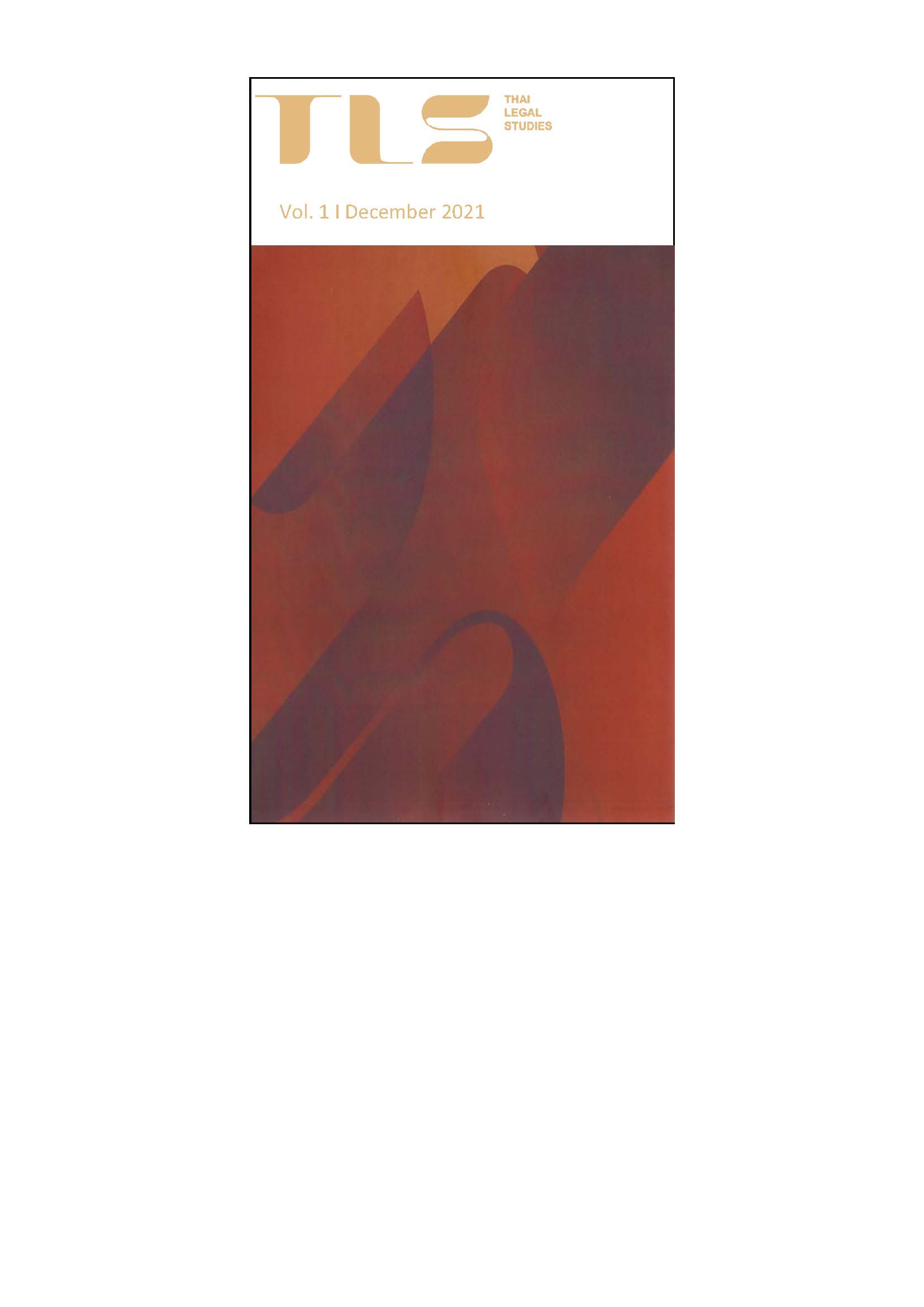Rights to Own and Operate a Hydro-Floating Solar Project in Thailand
DOI:
https://doi.org/10.54157/tls.246133Keywords:
Hydro-floating solar project, Public water resources, Electricity licenseAbstract
This paper finds that the current electricity regulatory regime, established by the Energy Industry Act B.E. 2550 (2007), together with the current electricity industry structure—the enhanced single buyer model—serves as a favorable legal basis for a state electricity enterprise, especially the Electricity Generating Authority of Thailand (EGAT), to own and operate a hydro-floating solar project in Thailand. However, it argues that, despite their ability to obtain the relevant licenses under the Energy Industry Act B.E. 2550 (2007) as well as enter into power purchase agreements with state electricity enterprises or private customers, the rights of private hydro-floating solar project operators to own and operate a hydro-floating solar project on the surface of public water resources are undermined by uncertainty pertaining to the possessory right over the water surface of public water resources, as well as unfair or discriminatory practices concerning electricity network access.
References
Choynowski, Peter. “Restructuring and Regulatory Reform in the Power Sector: Review of Experience and Issues.” Asian Development Bank (May 2004). https://www.adb.org/sites/default/files/publication/28187/wp052.pdf
Cohen, Eden, and Ryan Hogan. “Made in the Shade: Promoting Solar over Water Projects.” (2018) 54(1) Idaho Law Review 101.
Delmon, Jeffrey. Public-Private Partnership Projects in Infrastructure: An Essential Guide for Policy Makers (Cambridge University Press 2011). https://doi.org/10.1017/CBO9780511974403
“The Distribution Connection and Use of System Agreement.” (December 2020). https://www.dcusa.co.uk/dcusa-document/
“EGAT kicks off the World's Largest Hydro-Floating Solar Hybrid Project.” EGAT (January 2020). https://www.egat.co.th/en/news-announcement/news-release/egat-kicks-off-the-world-s-largest-hydro-floating solar-hybrid-project
Energy Policy and Planning Office. “Power Development Plan 2018.” Ministry of Energy (April 2019). http://www.eppo.go.th/images/POLICY/PDF/PDP2018.pdf
Grigoroudis, Evangelos, Vassilis S. Kouikoglou, Yannis A. Phillis, and Fotis D. Kanellos. “Energy Sustainability: A Definition and Assessment Model.” (2021) 21 Operational Research 1845–85. https://doi.org/10.1007/s12351-019-00492-2
Huenteler, Joern, Denzel Hankinson, Nicole Rosenthal, Ani Balabanyan, Arthur Kochnakyan, Tu Chi Nguyen, Anshul Rana, and Vivien Foster. “Cost Recovery and Financial Viability of the Power Sector in Developing Countries.” World Bank (January 2020). https://doi.org/10.1596/1813-9450-9136
Joskow, Paul L. “Lessons Learned from Electricity Market Liberalization.” (2008) 29 The Energy Journal, Special Issue: The Future of Electricity: Papers in Honor of David Newbery 9. https://doi.org/10.5547/ISSN0195-6574-EJ-Vol29-NoSI2-3
Kumar, Nallapaneni Manoj, Jayanna Kanchikere, and P. Mallikarjun. “Floatovolatics: Towards Improved Energy Efficiency, Land and Water Management.” (2018) 9(7) International Journal of Civil Engineering and Technology 1089.
Lovei, Laszlo. “The Single-Buyer Model: A Dangerous Path toward Competitive Electricity Markets.” World Bank (2000). https://doi.org/10.1596/11409
Michas, Serafeim, Vassilis Stavrakas, Niki-Artemis Spyridaki, and Alexandros Flamos. “Identifying Research Priorities for the Further Development and Deployment of Solar Photovoltaics.” (2019) 38(3) International Journal of Sustainable Development 276. https://doi.org/10.1080/14786451.2018.1495207
Office of Natural Resources and Environmental Policy and Planning. “Thailand’s Intended Nationally Determined Contribution (INDC).” UNFCCC (October 2015). https://www4.unfccc.int/sites/ndcstaging/PublishedDocuments/Thailand%20First/Thailand_INDC.pdf
“Power Purchasing from the Private Producer.” Energy Policy and Planning Office (2011). http://www.eppo.go.th/images/Power/pdf/buy.pdf
“Resolution of the Energy Policy and Planning Committee in the Meeting No.3/2006.” Energy Policy and Planning Office (September 2006). http://www.eppo.go.th/index.php/th/eppo-intranet/item/1741-nepc-thaksin106#s5
“Sacramento Municipal Utility District’s Rate Policy and Procedures Manual re: Distribution Wheeling Service.” Sacramento Municipal Utility District. https://www.smud.org/-/media/Documents/Going-Green/PDFs/Distribution-Wheeling-Service-Policies-and-Procedures.ashx
Sanchez, Rocio Gonzalez, Ioannis Kougias, Magda Moner-Girona, Fernando Fahl, and Arnulf Jäger-Waldau. “Assessment of Floating Solar Photovoltaic Potential in Existing Hydropower Reservoirs in Africa.” (2021) 169 Renewable Energy 687. https://doi.org/10.1016/j.renene.2021.01.041
“Summary of the Cabinet Resolution on the 29th of October 2019.” Royal Thai Government (October 2019). https://www.thaigov.go.th/news/contents/details/24140
Talus, Kim. Introduction to EU Energy Law (Oxford University Press 2016). https://doi.org/10.1093/acprof:oso/9780198791812.001.0001
Wah, Ang Beng, Lawrence Wai-Choong Wong, and Ng Tsan Sheng. “Energy Security: Definitions, Dimensions and Indexes.” (2015) 42 Renewable and Sustainable Energy Reviews 1077. https://doi.org/10.1016/j.rser.2014.10.064
“Where Sun Meets Water: Floating Solar Market Report.” World Bank (2018) 2. https://olc.worldbank.org/system/files/131291-WP-REVISED-P161277-PUBLIC.pdf
Published
Issue
Section
License
Copyright (c) 2021 Piti Eiamchamroonlarp

This work is licensed under a Creative Commons Attribution 4.0 International License.
Authors retain copyright and publishing rights without restrictions, but grant Thai Legal Studies the right of first publication in English and to distribute the work under a Creative Commons Attribution 4.0 International Public License (“CC BY 4.0”). It allows others to freely share the work, including the making of translations. There is no charge or fee for readers to immediately view published articles or content, and users are allowed to read, download, copy, distribute, print, search, link to the full texts of the articles, or use them for any other lawful purpose, without asking prior permission from Thai Legal Studies or the author(s), the only requirement being that an acknowledgement is given of the work’s authorship and its initial publication in English by Thai Legal Studies.







